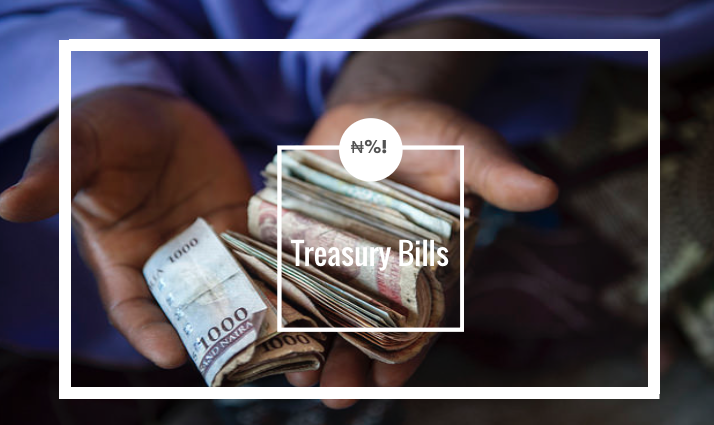- Market Awaits N32bn Inflow from Maturing Treasury Bills
Maturing treasury bills valued at a total of N32.23 billion is expected to hit the market this week.
Owing to this, the interbank lending rate has been projected to maintain stability this week in anticipation of the inflows.
Analysts at Cowry Assets Management Limited, which stated this in their weekly review, pointed out that in the week under review, Central Bank of Nigeria auctioned treasury bills worth N117.18 billion, viz: 91-day bills worth N7.89 billion, 182-day bills worth N6.21 billion and 364-day bills worth N117.18 billion.
In line with expectation, the respective stop rates of the bills fell to 12.95 per cent (from 13.00%), 15 per cent (from 15.25%) and 15.57 per cent (from 15.60%) Also, treasury bills worth N72.34 billion were sold via Open Market Operations.
But the outflows were more than offset by inflows worth N249.12 billion in matured treasury bills. However, NIBOR for overnight funds, 1 month, 3 months and 6 months tenor buckets rose week-on-week to 31.29 per cent (from 26.05%), 19.17 per cent (from 17.99%), 20.18 per cent (from 19.84%) and 22.46 per cent (from 22.18%) respectively.
Elsewhere, NITTY moved in mixed directions: yields on the 1-month and 3-month maturities increased to 16.75 per cent (from 14.69) and 15.98 per cent(from 15.72%) respectively.
However, yields on the 6 months and 12 months maturities fell to 18.98 per cent (from 19.03) and 17.79% (from 17.86%) respectively.
Forex Market
In the just concluded week, the naira/dollarexchange rate steadied week-on-week at the at both the bureau de change and parallel market segments at N361 to a dollar and N364 to a dollar respectively.
The local currency however depreciated week-to-date by 0.30 per cent to N331 to a dollar at the interbank market (NIFEX) on the back of increased foreign exchange demand.
Similarly, the naira lost at the I&E foreign exchangewindow by 11 kobo to close at N360.65 to a dollar as at Thursday. These were despite injections by the CBN worth $210 million into the foreign exchange market of which $100 million was allocated to wholesale (SMIS), $55 million was allocated to small and medium scale enterprises and $55 million was sold for invisibles. Meanwhile, a report by Cowry Assets Management Limited showed that dated forward contracts at the interbank OTC segment appreciated amid sustained increase in the foreign exchange reserves – available data showed external reserves increased month-to-date by 2.08 per cent to $34.53 billion as at Friday, November 24, 2017.
Also, the 1-month, 2-month, 3-month and 6-month contracts appreciated week-on-week by 0.12 per cent, 0.21 per cent, 0.33 per cent and 0.50 per centto close at N364.75/$, N369.82/$, N375.26/$and N394.41/$ respectively.
“This week, we retain our stable outlook for the exchange rate amid sustained stability in global crude oil prices which should result in further build-up in foreign reserves as well as CBN’s continued intervention in the various segments of the interbank foreign exchange market,” analysts at Cowry Assets added.
Bond Market
In the just concluded week, local OTC bond prices declined (and yields increased) across most maturities followed renewed profit taking activity.
Specifically, the 20-year, 10.00% FGN July 2030 bond, the 10-year, 16.39% FGN JAN 2022 paper, the 7-year, 16.00% FGN JUN 2019 paper and the 5-year, 14.50% FGN JUL 2021 paper depreciated by 20kobo, 6 kobo, 76 kobo and 78 kobo respectively,while their corresponding yields increased to 14.66per cent (from 14.62%), 14.52 per cent (from 14.51%), 15.05 per cent (from 14.51%) and 15.05per cent (from 14.76%). Elsewhere, FGN Eurobonds prices tanked across the maturities amid resumed profit taking activity on the London Stock Exchange.
Specifically, the 10-year bonds, 6.75% JAN 28, 2021 and 6.38% JUL 12, 2023 shed N0.03 and N0.21 respectively (corresponding yields increased to 4.57% and 5.26% from 4.57% and 5.22% respectively); however, the 5-year, 5.13% JUL 12, 2018 bond gained N0.04 (yield fell to 3.35 from 3.49%).
“This week, we anticipate a mix of bargain hunting and profit taking activity at the domestic OTC bond market amid expectation of limited boost liquidity,” it added.
Emefiele at UNN
The Governor of the Central Bank of Nigeria (CBN), Mr. Godwin Emefiele last week affirmed that with the Nigerian economy exiting the recession, following a number of policy responses, the worst days were clearly behind the country. Emefiele noted that based on analyses and understanding of the developments which confronted the country, the central bank took a number of measures, many of which were at the time vigorously criticised, but which helped the economy out of the recession.
Tracing the economic recession to the significant and persistent drop in commodity prices that affected the economy adversely, Emefiele said the resultant effect was depressed GDP growth, rising inflation, depreciation of the exchange rate, as well as depletion of the country’s foreign exchange (FX) reserves, and the decline in average FX inflows.
Emefiele, who delivered the 47th convocation lecture of the University of Nigeria, Nsukka (UNN), pointed out that the vulnerabilities of Nigeria to the global shocks were amplified because of the nation’s over-reliance on the oil sector for FX revenue and for government finances.
“Even at the height of high oil prices, rather than save, we drained our buffers through an excessive dependence on imports, most of which could be produced locally.
“Based on our analyses and understanding of these developments, the Bank took a number of measures many of which were at the time vigorously criticised,” he said.
The CBN governor noted that in the realm of monetary policies, the CBN embarked on a cycle of policy tightening to rein in inflation, using the Monetary Policy Rate (MPR) and Open Market Operations (OMO).


 Forex3 weeks ago
Forex3 weeks ago


 Naira2 weeks ago
Naira2 weeks ago
 Billionaire Watch2 weeks ago
Billionaire Watch2 weeks ago




 Naira2 weeks ago
Naira2 weeks ago




 Naira2 weeks ago
Naira2 weeks ago




 Naira1 week ago
Naira1 week ago




 Naira4 weeks ago
Naira4 weeks ago




 Naira3 weeks ago
Naira3 weeks ago





















